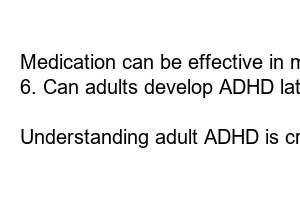성인 ADHD 증상
Title: Understanding ADHD Symptoms in Adults: Unmasking the Unseen Challenges
Introduction:
In our society, attention deficit hyperactivity disorder (ADHD) is often associated with children. However, it is essential to recognize that ADHD also affects a significant portion of adults. Living with ADHD can present unique challenges, and understanding the symptoms is crucial for both individuals struggling with the disorder and those who support them. This blog post aims to shed light on the symptoms of ADHD in adults, emphasizing the impact it can have on daily life and relationships.
1. What is ADHD in adulthood?
ADHD, a neurodevelopmental disorder, is characterized by persistent difficulties with attention, impulsivity, and hyperactivity. While these symptoms are more commonly associated with children, ADHD can extend into adulthood, having a profound impact on personal and professional spheres.
People with adult ADHD often face challenges in organizing tasks, sustaining focus, and managing time effectively. These difficulties can lead to chronic procrastination, forgetfulness, and a sense of being overwhelmed by responsibilities.
2. Common symptoms of adult ADHD:
– **Inattention:** Adults with ADHD frequently struggle to concentrate for long periods, experience trouble listening, and have difficulty following through on tasks or instructions.
– **Hyperactivity:** While not as apparent as in children, adults with ADHD may feel restless and have difficulty sitting still for extended periods. They may also engage in fidgeting or excessive talking.
– **Impulsivity:** Impulsive behavior is common in adults with ADHD. This includes acting without considering consequences, speaking impulsively, and interrupting others during conversations.
3. Emotional and relational impact:
ADHD can significantly impact emotional well-being, leading to frustration, low self-esteem, and mood swings. Adults with ADHD may struggle with self-regulation, often experiencing difficulty managing stress, anger, and controlling emotional outbursts. These challenges can strain relationships with partners, family, and friends.
4. Work and productivity:
The symptoms of adult ADHD can severely impact professional life. Difficulties with focus, organization, and time management can lead to decreased productivity, missed deadlines, and increased stress levels. However, many adults with ADHD demonstrate unique strengths such as creativity, flexibility, and hyperfocus, which can prove advantageous in certain careers.
5. Seeking diagnosis and treatment:
Recognizing the symptoms of ADHD is the first step towards seeking diagnosis and appropriate treatment. A comprehensive evaluation by a healthcare professional experienced in ADHD diagnosis is crucial. Treatment options may include medication, therapy, lifestyle changes, and developing effective coping strategies.
6. Strategies and support:
Managing adult ADHD involves implementing strategies to enhance focus, improve organization, and increase productivity. Utilizing tools such as calendars, reminders, and breaking tasks into smaller, manageable steps can be immensely beneficial. Seeking support from loved ones, joining support groups, or engaging in therapy can also provide valuable assistance.
FAQs:
1. Can adults outgrow ADHD?
While the hyperactivity aspect may reduce with age, ADHD symptoms often persist into adulthood. However, with proper diagnosis, support, and treatment, individuals can learn to manage their symptoms effectively.
2. Is ADHD only diagnosed in childhood?
ADHD can be diagnosed in both childhood and adulthood. Many adults receive a diagnosis later in life, realizing that the challenges they faced were due to undiagnosed ADHD.
3. Can adults with ADHD lead successful lives?
Absolutely! With the right support, treatment, and strategies, adults with ADHD can thrive in various aspects of life, including career, relationships, and personal growth.
4. Is ADHD only a problem with concentration?
No, ADHD encompasses a range of symptoms that extend beyond concentration difficulties. Emotional regulation, impulsivity, and challenges with organization and time management are also key aspects.
5. Will medication solve all ADHD-related problems?
Medication can be effective in managing ADHD symptoms, but it is not a cure-all. Combining medication with therapy, lifestyle changes, and support systems can yield better results in managing symptoms.
6. Can adults develop ADHD later in life?
While ADHD typically manifests in childhood, some individuals may experience symptoms later in life due to factors such as hormonal changes, stress, or trauma.
Summary:
Understanding adult ADHD is crucial for individuals living with the disorder, as well as their support systems. From challenges with attention and hyperactivity to emotional well-being and work productivity, ADHD affects various aspects of adult life. With proper diagnosis, treatment, strategies, and support, individuals with ADHD can lead fulfilling lives, utilizing their unique strengths and managing their challenges.

